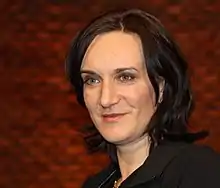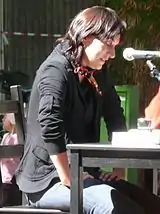Terézia Mora
Terézia Mora ([ˈtɛreːziɒ ˈmorɒ]; born 5 February 1971) is a German Hungarian writer, screenwriter and translator.
Terézia Mora | |
|---|---|
 Terézia Mora (2010) | |
| Born | 5 February 1971 |
| Nationality | Hungarian |
| Alma mater | Humboldt University Deutsche Film- und Fernsehakademie Berlin |
| Occupation(s) | Screenwriter Translator Writer |
| Website | Official website |
Early life and education
Terézia Mora was born in Sopron, Hungary, to a family with German roots and grew up bilingual.[1] She moved to Germany after the political changes in Hungary in 1990 in order to study Hungarian studies and drama at the Humboldt University of Berlin. Subsequently she trained as a screenwriter at the Deutsche Film- und Fernsehakademie Berlin.[2]
Career
Mora is working on a trilogy about the IT specialist Darius Kopp, of which Volume I, "The Only Man on the Continent," and Volume II, "The Monster," have already appeared.
She is a member of the German PEN Center and the Deutsche Akademie für Sprache und Dichtung, to which she was elected as a member in 2015.[3]
Since 1990 she has lived in Berlin, working as a freelance writer, writing in German.[3][4]
Mora is married and has one daughter.[2]
Awards and honours
- 1997: Würth Literature Prize for her screenplay The Ways of Water in Erzincan and the Open-Mike-Literary Prize of the Berliner LiteraturWERKstatt for the tale Durst
- 1999: Ingeborg Bachmann Prize for the narration Der Fall Ophelia (The case of Ophelia), contained in her first volume of stories Seltsame Materie (Strange Matter)
- 2000: Adelbert von Chamisso Prize (promotional prize)
- 2001: Island writer on Sylt
- 2002: Jane Scraberd Prize of the Heinrich Maria Ledig-Rowohlt Foundation for her translation of Péter Esterházy's Harmonia Caelesti
- 2004: Mara Cassens Prize, Prize for the Art Prize of the Academy of Arts (Berlin), Prize of the Leipzig Book Fair for her novel Alle Tage (Category: Fiction)
- 2005: Prize of LiteraTour Nord
- 2006: Villa Massimo scholarship
- 2006/2007: Tübingen Poetry Lecturer together with Péter Esterházy
- 2007: Franz Nabl Prize
- 2010: Adelbert von Chamisso Prize, Erich Fried Prize
- 2011: Translation Prize of the Kunststiftung NRW for her translation by Péter Esterházy's A production novel (two production novels) from the Hungarian and at the same time for her life's work [5]
- 2011: "Grenzgänger-Scholarship" by the Robert Bosch Foundation for research on The Monster2013: German Book Prize for The Monster
- October 2013: German Book Prize for her novel Das Ungeheuer[5]
- 2013/2014: Frankfurt Poetics Lecturer
- 2017: Bremen Literature Prize for Love Among Aliens
- 2017: Preis der Literaturhäuser
- 2017: Solothurner Literaturpreis
- 2018: Roswitha Prize[6]
- 2018: Georg Büchner Prize[7]
- 2021: Cross of the Order of Merit of the Federal Republic of Germany
On 3 July 2018, it was announced by the German Academy for Language and Literature that she will be presented the Georg Büchner Prize, one of Germany's highest literary honors, at a ceremony in October 2018. The prize comes with an award of 50,000 euros.[8]
Works

Prose
- Strange matter, Rowohlt Verlag, Reinbek 1999, ISBN 978-3-498-04471-8
- Alle Tage, Luchterhand Literaturverlag, Munich 2004, ISBN 978-3-630-87185-1
- The only man on the continent, Luchterhand Literaturverlag, Munich 2009, ISBN 978-3-630-87271-1
- The monster, Luchterhand Literaturverlag, Munich 2013, ISBN 978-3-630-87365-7
- Love among aliens, narratives. Luchterhand Literaturverlag, Munich 2016, ISBN 978-3-630-87319-0
Poetry lectures
Screenplays
- The Ways of Water in Erzincan, feature film, 30 min. (1998)
- Boomtown / End of the City, feature film, 30 min. (1999)
- The Alibi, screenplay for a thriller shown in German TV,[9] 90 min. (2000)
Plays
- Something like that (2003)
Audiobooks
- Miss June Ruby (2005)
Essays
- About the drastic, in: BELLA triste No. 16 (2006)
Translations
- Als nur die Tiere lebten (2014), translation of Amikor még csak az állatok éltek, (2012), by Zsófia Bán.
- Abendschule – Ein Fibel für Erwachsene (2012), translation of Esti iskola – Olvasókönyv felnőtteknek, (2007), by Zsófia Bán
References
- "Terézia Mora – Was bedeutet die Zweisprachigkeit für Ihr Schreiben?". Deutschlandfunk Kultur (in German). Retrieved 2 August 2018.
- Krekeler, Elmar (7 October 2013). "Deutscher Buchpreis: Terézia Mora – Eine Frau schreibt sich in die Freiheit". Die Welt. Retrieved 2 August 2018.
- "Deutsche Akademie für Sprache und Dichtung – Akademie – Presse – Neue Mitglieder". www.deutscheakademie.de (in German). Retrieved 2 August 2018.
- "Roman "Das Ungeheuer": Terézia Mora erhält Deutschen Buchpreis". Spiegel Online. 7 October 2013. Retrieved 2 August 2018.
- "Terézia Mora wins the German Book Prize 2013 for her novel "Das Ungeheuer"" (Press release). Deutscher Buch Preis. 7 October 2013. Archived from the original on 11 October 2013. Retrieved 8 October 2013.
- NDR. "Roswitha-Preis 2018 geht an Terézia Mora" (in German). Retrieved 2 August 2018.
- "Terezia Mora erhält Georg-Büchner-Preis". news.ORF.at (in German). 3 July 2018. Retrieved 2 August 2018.
- "Deutsche Akademie für Sprache und Dichtung – Awards – Georg-Büchner-Preis". www.deutscheakademie.de.
- "Das Alibi" – via www.imdb.com.
External links
- Official website (in German)